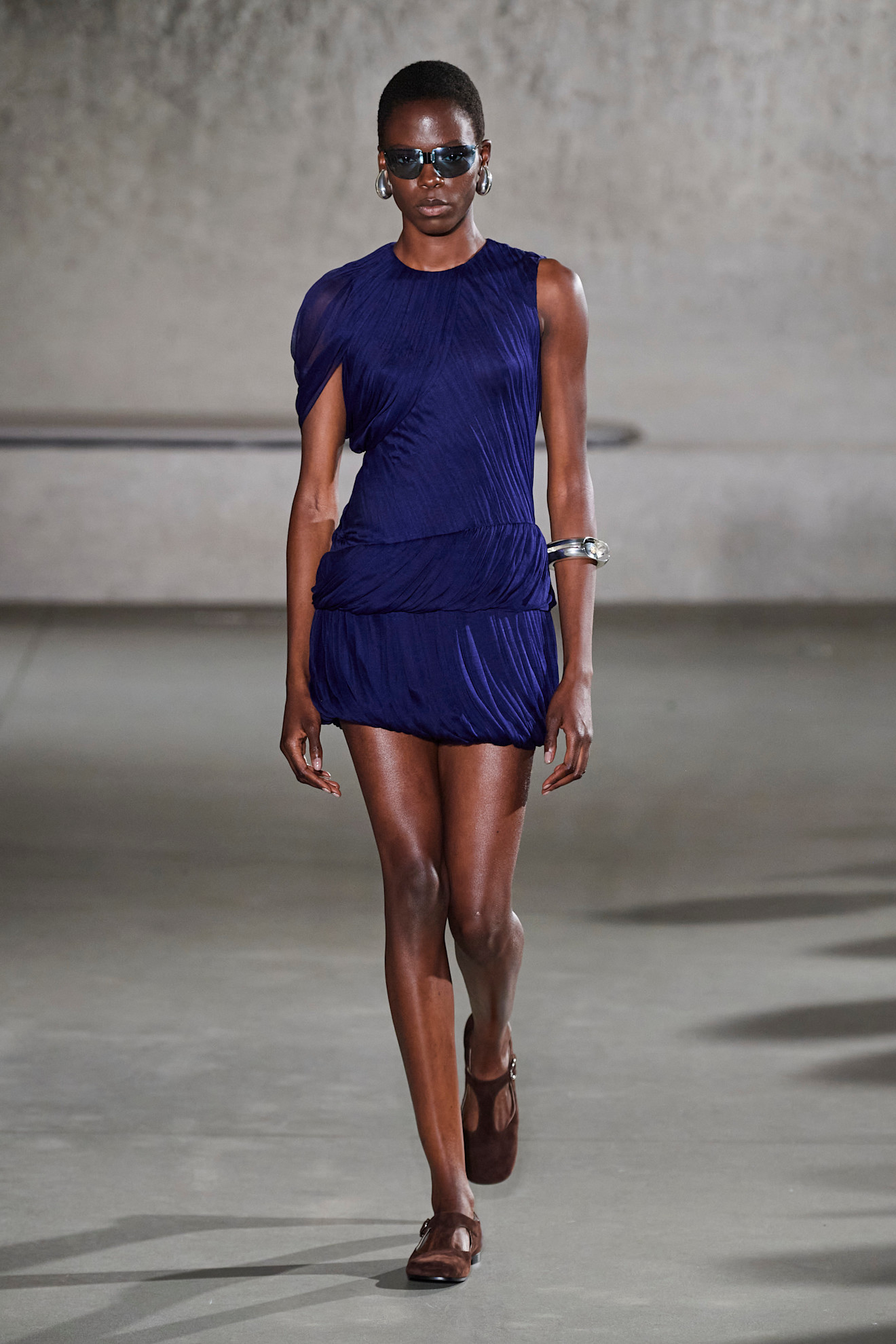Elegant, Rich Looking, and Pretty to a Fault: Meet the Trend Fashion People Are Losing It Over

If I’m being real with myself, I’ve never been much of a dress person. I rely on skirts, trousers, and jeans for 99% of my outfits, only opting for the dresses in my closet for special occasions or days when I’m feeling especially stumped about what to wear. Some dresses, however, are simply superior to the rest, and when they come around, my usual tendency to avoid the clothing genre goes right out the window.
One such dress debuted on Tory Burch’s S/S 24 runway last September during New York Fashion Week. Well over a year later, I can still remember the first time I saw it and the immediate pull I felt to eventually make it mine. Shown in two colors—soft jade and royal purple—the dress featured allover delicate draping, a sheer sleeve, and a micro hemline. It was not unlike the Grecian dresses you see women in paintings and sculptures wear from thousands of years ago, though far more modern and practical in today’s fashion landscape.


It became clear not long after that I wasn’t the only person in attendance at the show or watching from afar who took a liking to what’s now called the Goddess Dress. In November, Emily Ratajkowski attended the CFDA Awards alongside Tory Burch wearing the dress with matching satin peep-toe mules. Brazilian actress Bruna Marquezine wore a custom version to Variety’s 2024 Power of Women event a few months after the show. At the two Tory Burch shows that have taken place since the Goddess Dress debuted, I’ve seen the dress on multiple attendees. It was also worn on the red carpet at the Victoria’s Secret Fashion Show earlier this fall.

When I set my mind to something, rarely can anyone stop me, and I set my mind to obtaining the Goddess Dress no matter what. To get a feel for what it would look like on me, I borrowed one to wear to the Monaco Grand Prix in May of this year. Once I had it in my possession, I knew I had to have it. Ahead of fashion week, I splurged and never looked back, styling it for Tory Burch’s show with a black Proenza Schouler technical jacket and a Tory Burch Lee Radziwill Cat Eye Bag from a few seasons prior. I’ve never received so many compliments.

Shortly thereafter, the Goddess Dress was brought back in a new colorway and different silhouettes, including a midi skirt and matching top. Its unique draping method was also used in subsequent Tory Burch collections, becoming almost a signature for the brand at this point and something fans like myself look forward to seeing and shopping.
Shop draped dresses and separates from Tory Burch:
This season, draping proved to be one of the most present fabric techniques on the runways, tying back to a larger aesthetic we called “craving romance” that features an abundance of sheer and chiffon fabrics, soft florals and colors, and, of course, wispy draping. At Stella McCartney, the trend took shape in the form of minidresses in a variety of colors and lightweight materials. Tory Burch continued the trend with sheer silk blouses in white and mauve that were styled alongside ruched trousers in an almost NSFW fashion. Perhaps most impactful were the sculpture-like tops and dresses at Victoria Beckham’s show, which appeared to be molded to each model’s skin like papier-mâché or clay.



All that is to say that the delicate drapes from Tory Burch’s show all the way back in 2023 aren’t some sort of fleeting trend. We’ll be seeing new iterations well into 2025, making now the perfect time to invest in one of the prettiest trends you’ll find in the year ahead. From skirts and tops to dresses, shop the drapiest pieces on the market below. As I’m someone who invested a lot into this trend, trust me—it’s worth it.
Shop the draped-fabric trend:
Explore More:
Source: WhoWhatWear
Related Posts
- 5 foods you must have if want Korean Glass Skin
- I Asked the Coolest People I Know: What Makes an It-Girl Lip Balm?
- 7 hairstyles for women popular in 2025 weddings
- 12 Coconut Perfumes That Smell Like an Expensive Vacation (and Not Sunscreen)
- The 6 Hats Everyone Will Be Wearing Instead of Bucket Hats This Summer





